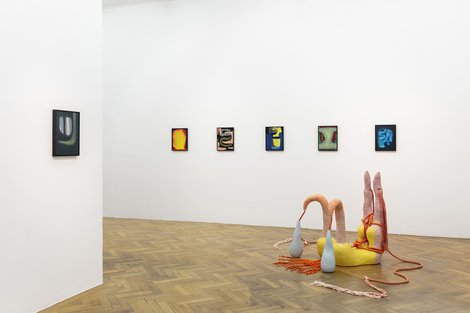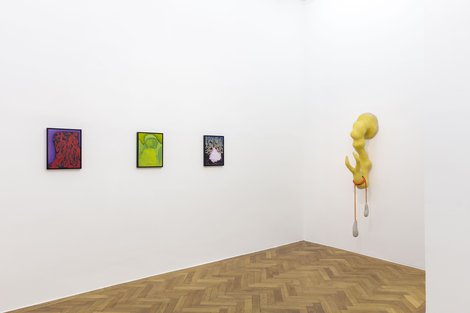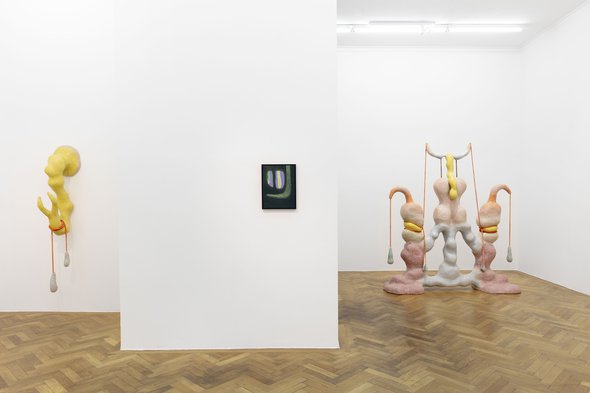Various Others 2021
Veronika Hilger & Zsófia Keresztes
Veronika Hilger & Zsófia Keresztes
Sperling in collaboration with GIANNI MANHATTAN
Zsófia Keresztes’ sculptural beings confront us without hesitation. In a manner both revealing and disarming, they seem to address us. Their surreal-organic appearance demands our empathy. Despite their pastel colors, these exuberant mutations take their space and allow their ambiguity to work in it: occult, organically growing, symmetrical, emotional, lustful, painful, smooth, paranormal.
The conic ends of the works can be read as spikes, horns, or thorns. They function as antipodes to the tear-like drops hanging from cords, which increasingly appear in the Hungarian artist's recent work. With playful sensitivity and a penchant for the grotesque, Keresztes focuses on the sculptural retranslation of human sensibility. She succeeds in expressing emotional states and sensations in anthropomorphic forms by means of the association of corporeality. These formal inventions appear like analogies to basic constellations of human relationships – even in times of virtual contact and digital communication. Looking even more closely, we perceive the pixels in the surface of the mosaic sculptures. For several years now, the artist has been working with glass mosaics, like the ones in bathroom interiors, which lend her work not only shine and enclosedness, but also a certain intangibility. Serendipitously, the smooth aesthetics of virtual fantasy evoke the symbolism and sensitivity of an artist like Louise Bourgeois. Through the clash of fragmented, geometric austerity and biomorphic forms, Keresztes adds an artificial virtuality to her organic, intricate compositions.
Zsófia Keresztes’ sculptural beings confront us without hesitation. In a manner both revealing and disarming, they seem to address us. Their surreal-organic appearance demands our empathy. Despite their pastel colors, these exuberant mutations take their space and allow their ambiguity to work in it: occult, organically growing, symmetrical, emotional, lustful, painful, smooth, paranormal.
The conic ends of the works can be read as spikes, horns, or thorns. They function as antipodes to the tear-like drops hanging from cords, which increasingly appear in the Hungarian artist's recent work. With playful sensitivity and a penchant for the grotesque, Keresztes focuses on the sculptural retranslation of human sensibility. She succeeds in expressing emotional states and sensations in anthropomorphic forms by means of the association of corporeality. These formal inventions appear like analogies to basic constellations of human relationships – even in times of virtual contact and digital communication. Looking even more closely, we perceive the pixels in the surface of the mosaic sculptures. For several years now, the artist has been working with glass mosaics, like the ones in bathroom interiors, which lend her work not only shine and enclosedness, but also a certain intangibility. Serendipitously, the smooth aesthetics of virtual fantasy evoke the symbolism and sensitivity of an artist like Louise Bourgeois. Through the clash of fragmented, geometric austerity and biomorphic forms, Keresztes adds an artificial virtuality to her organic, intricate compositions.

10.09.21—16.10.21
Regerplatz 9, 81541 Munich, Germany
> Installation views
Sperling in collaboration with GIANNI MANHATTAN
Zsófia Keresztes’ sculptural beings confront us without hesitation. In a manner both revealing and disarming, they seem to address us. Their surreal-organic appearance demands our empathy. Despite their pastel colors, these exuberant mutations take their space and allow their ambiguity to work in it: occult, organically growing, symmetrical, emotional, lustful, painful, smooth, paranormal.
The conic ends of the works can be read as spikes, horns, or thorns. They function as antipodes to the tear-like drops hanging from cords, which increasingly appear in the Hungarian artist's recent work. With playful sensitivity and a penchant for the grotesque, Keresztes focuses on the sculptural retranslation of human sensibility. She succeeds in expressing emotional states and sensations in anthropomorphic forms by means of the association of corporeality. These formal inventions appear like analogies to basic constellations of human relationships – even in times of virtual contact and digital communication. Looking even more closely, we perceive the pixels in the surface of the mosaic sculptures. For several years now, the artist has been working with glass mosaics, like the ones in bathroom interiors, which lend her work not only shine and enclosedness, but also a certain intangibility. Serendipitously, the smooth aesthetics of virtual fantasy evoke the symbolism and sensitivity of an artist like Louise Bourgeois. Through the clash of fragmented, geometric austerity and biomorphic forms, Keresztes adds an artificial virtuality to her organic, intricate compositions.
Zsófia Keresztes’ sculptural beings confront us without hesitation. In a manner both revealing and disarming, they seem to address us. Their surreal-organic appearance demands our empathy. Despite their pastel colors, these exuberant mutations take their space and allow their ambiguity to work in it: occult, organically growing, symmetrical, emotional, lustful, painful, smooth, paranormal.
The conic ends of the works can be read as spikes, horns, or thorns. They function as antipodes to the tear-like drops hanging from cords, which increasingly appear in the Hungarian artist's recent work. With playful sensitivity and a penchant for the grotesque, Keresztes focuses on the sculptural retranslation of human sensibility. She succeeds in expressing emotional states and sensations in anthropomorphic forms by means of the association of corporeality. These formal inventions appear like analogies to basic constellations of human relationships – even in times of virtual contact and digital communication. Looking even more closely, we perceive the pixels in the surface of the mosaic sculptures. For several years now, the artist has been working with glass mosaics, like the ones in bathroom interiors, which lend her work not only shine and enclosedness, but also a certain intangibility. Serendipitously, the smooth aesthetics of virtual fantasy evoke the symbolism and sensitivity of an artist like Louise Bourgeois. Through the clash of fragmented, geometric austerity and biomorphic forms, Keresztes adds an artificial virtuality to her organic, intricate compositions.
In contrast, the small-format paintings by Veronika Hilger seem to look inward and to be contentedly self-sufficient. Speculatively, we stand before canvases of similar sizes as the speed of our perception slows down. Little by little we seem to enter new visual realms. Our wandering mind scans not only the presented world but also our own pictorial memory. At first, however, we run into the void and must recognize that these paintings are different to anything we know. The artist hints at traditional genres – portrait, still life, landscape – but only in order to purposefully undermine them and go to unknown spheres of visual subconsciousness. Using oil paints, she transfers intuitively found forms directly on paper which is laminated on wooden plates, creating several works simultaneously. During a careful process of pauses and corrections, her motifs emerge from a dialogue of materiality, color, and form, deliberately remaining in a state of indeterminacy and ambiguity. In addition to the strong colors, other similarities can be found. The pictorial space – divided into foreground, middle, and background – serves as the stage for abstract, humanoid, floral, and surreal forms interacting with each other. Her untitled works create diverse associations: Microscopic depictions of cellular structures, otherworldly plant creatures, geological studies of earth layers, new life forms, caves, windows, and deep sea worlds. These works, even after completion, continue to be in a constant state of becoming. Their inherent evocative nature forces us to participate, to see, to speculate, and to make decisions about what we wish to discern here.
At the intersection of indecision and antagonisms, which not only characterize the history of abstraction, but also of our existence, the approaches of Zsófia Keresztes and Veronika Hilger come close to each other. Abandoning all narrative, both practices suspend binary dualisms and promote the erosion of univocality that we can also find in current discourses on identity and biopolitics. In their respective medium, both artists appeal for alterities, a neither-nor, a both-and. Hilger and Keresztes are aware of the intimacy, emotional turmoil, and vulnerability that accompany these synthesizing developments. They make ambivalence tangible in their works, in the tension between abstraction and figuration, formlessness and form, proximity and distance. It is, therefore, not surprising that they have such individual starting points and diverse levels of reflection. Instead, the call for tolerance for ambiguity (Ambiguitätstoleranz) is the unifying quality feature in their art, with which we should all identify, because it leads us not only to the other, but also to ourselves.
—Text by Christian Ganzenberg
At the intersection of indecision and antagonisms, which not only characterize the history of abstraction, but also of our existence, the approaches of Zsófia Keresztes and Veronika Hilger come close to each other. Abandoning all narrative, both practices suspend binary dualisms and promote the erosion of univocality that we can also find in current discourses on identity and biopolitics. In their respective medium, both artists appeal for alterities, a neither-nor, a both-and. Hilger and Keresztes are aware of the intimacy, emotional turmoil, and vulnerability that accompany these synthesizing developments. They make ambivalence tangible in their works, in the tension between abstraction and figuration, formlessness and form, proximity and distance. It is, therefore, not surprising that they have such individual starting points and diverse levels of reflection. Instead, the call for tolerance for ambiguity (Ambiguitätstoleranz) is the unifying quality feature in their art, with which we should all identify, because it leads us not only to the other, but also to ourselves.
—Text by Christian Ganzenberg

‘Ambiguity renounces that one must decide because it rejects dualisms and maintains itself in transition, it returns to the point of indivisibility of what was then put in opposition. […] The intimate is thus ambiguous because it does not have to recognize the classical dichotomies of “body” and “soul” or “sensual” and “spiritual”, “physical” and “metaphysical”, it does not even imagine them. Its resource is to oscillate indefinitely between the two, and its reason, consequently, is to undo oppositions. In the moment of seizure, the possessive discovers itself to be sharing; the Self overcomes the border of the Other, but only in order to lose itself.’
—François Jullien: De l'intime: Loin du bruyant Amour, Paris 2014, p. 167 [excerpt translated from the French]
—François Jullien: De l'intime: Loin du bruyant Amour, Paris 2014, p. 167 [excerpt translated from the French]
